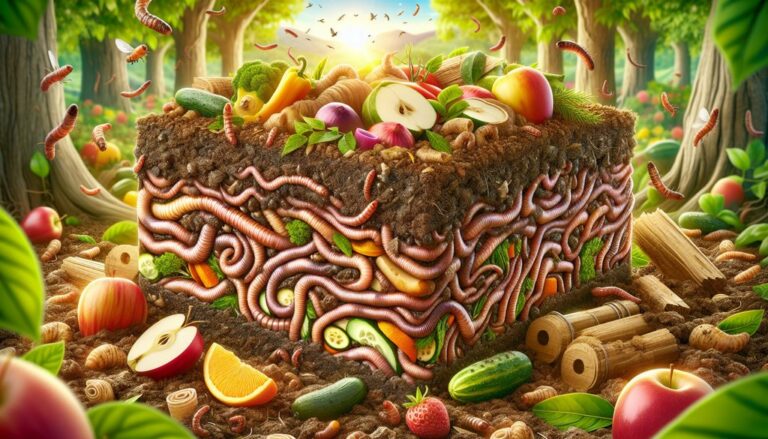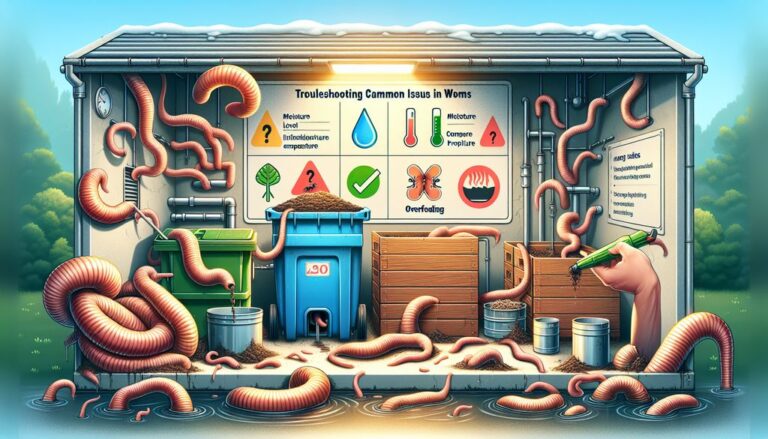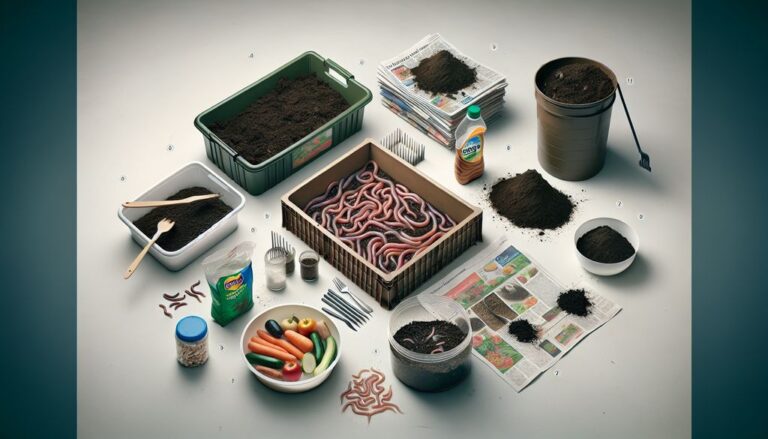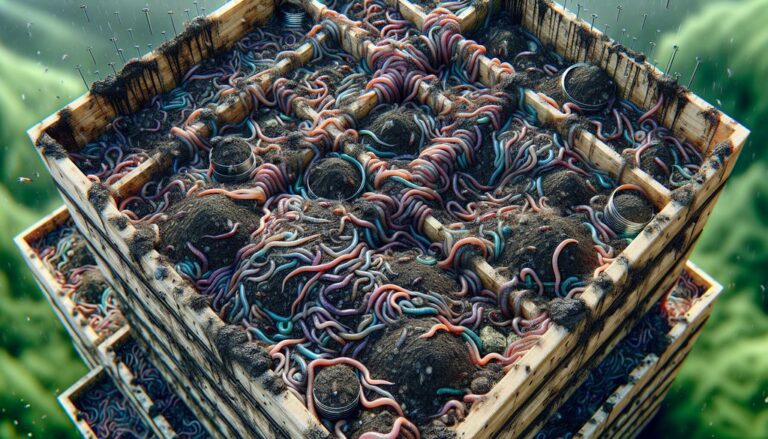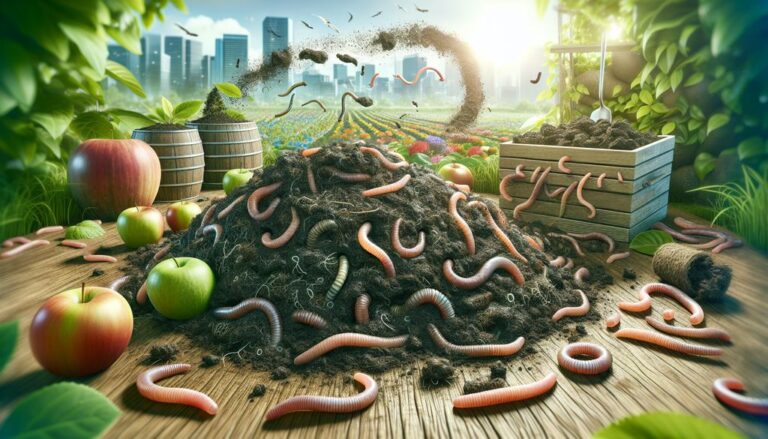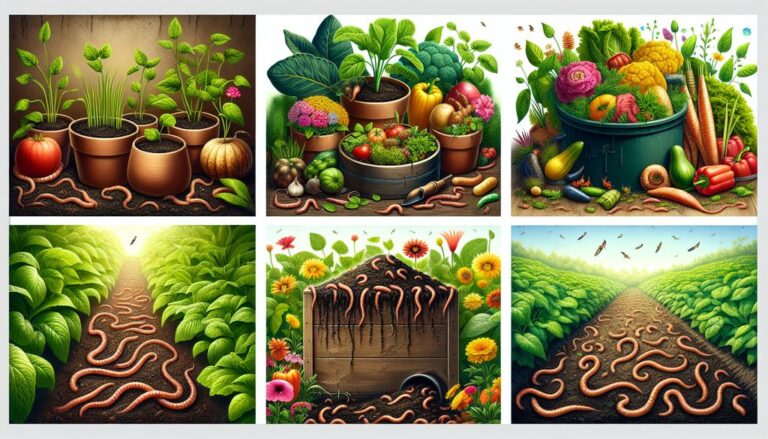Vermicomposting is a fascinating and eco-friendly method of composting that utilizes worms to break down organic materials into nutrient-rich compost. Not only does vermicomposting reduce waste and landfill use, but it also provides a valuable source of natural fertilizer for plants and gardens. By following the vermiculture process and understanding the key facts about vermicomposting, you can easily incorporate this sustainable practice into your daily life. In this article, we will explore 10 key facts about vermicomposting that will give you a deeper understanding of this sustainable practice. From the benefits of vermicomposting to the types of worms used, we will cover a range of topics to pique your interest and inspire you to take up this eco-friendly endeavor. So, whether you are new to vermicomposting or looking to expand your knowledge, buckle up and get ready to dive into the world of earthworms and decomposing organic matter!
Key Takeaways
- Vermicomposting reduces waste and landfill use
- Vermicompost provides natural fertilizer for plants and gardens
- Vermicomposting is a sustainable and eco-friendly practice
- Red wiggler worms are the stars of vermicomposting
- Vermicomposting is educational and fun for kids
Understanding Vermicomposting
What is Vermicomposting?
Vermicomposting is a natural recycling process where worms, typically red wigglers, transform organic waste into a rich soil amendment known as vermicompost. This method is a sustainable way to manage kitchen scraps and yard debris, turning what would otherwise be waste into a valuable resource for gardening and agriculture.
The process is straightforward and can be summarized in a few key steps:
- Organic waste is collected and placed in a bin or pile.
- Red wiggler worms are added to the bin to feed on the waste.
- Over time, the worms break down the material into compost.
- The finished vermicompost is harvested and used to enrich soil.
Vermicomposting not only diverts waste from landfills but also enhances soil quality, making it an integral part of organic farming practices.
The Role of Red Wiggler Worms
Red wiggler worms, or Eisenia fetida, are the powerhouse of vermicomposting systems. Their ability to consume and process large amounts of organic waste makes them ideal for turning kitchen scraps and yard waste into nutrient-rich compost. These worms thrive in the decomposing environment of a vermicompost bin, where they work diligently to break down organic material.
Red wigglers are not only efficient composters but also reproduce quickly, ensuring a sustainable population for ongoing vermicomposting efforts.
Here are some reasons why red wigglers are preferred in vermicomposting:
- High consumption rate: Red wigglers can eat up to their body weight in waste each day.
- Rapid reproduction: They reproduce quickly, which helps maintain a robust worm population.
- Nutrient-rich castings: Their castings (worm poop) are high in nutrients, beneficial for plant growth.
- Adaptability: They are adaptable to various climates and indoor or outdoor composting setups.
By harnessing the natural behavior of red wiggler worms, vermicomposting becomes a highly effective method of recycling organic waste into valuable compost for organic farming.
Benefits of Vermicomposting
Vermicomposting offers a myriad of advantages for both the environment and garden enthusiasts. It transforms organic waste into a valuable resource, reducing the need for chemical fertilizers and enhancing soil quality. This process not only diverts waste from landfills, thereby mitigating methane emissions, but also produces a compost rich in nutrients and beneficial microorganisms.
The benefits of vermicomposting include:
- Reduction of organic waste sent to landfills
- Decrease in greenhouse gas emissions
- Creation of nutrient-rich compost
- Improvement in soil health
- Stimulation of plant growth
Vermicomposting is a highly efficient process that can be adapted to various scales, from a small kitchen bin to large commercial operations. With the help of red wiggler worms, organic waste is rapidly broken down, often within a few months, which is significantly faster than traditional composting methods.
By engaging in vermicomposting, individuals and communities contribute to a more sustainable future, promoting soil health and reducing environmental impact. It’s a simple yet powerful way to make a positive difference.
Speedy Decomposition
One of the most remarkable aspects of vermicomposting is its speedy decomposition rate. Red wiggler worms are voracious eaters and can consume up to their own body weight in organic matter every day. This means that, with a healthy population of worms, your kitchen scraps and yard trimmings can transform into nutrient-rich compost in just a few months.
The efficiency of vermicomposting is a game-changer for organic farming. It allows for the rapid recycling of organic waste into a form that can benefit soil and plants much quicker than traditional composting methods.
Factors influencing the speed of decomposition include the temperature of the environment, the size of the worm population, and the types of organic materials provided. Here’s a simple list of tips to ensure optimal decomposition rates:
- Maintain a balanced diet for the worms, including fruit and vegetable scraps, coffee grounds, and eggshells.
- Avoid adding meats, dairy, and oily foods that can attract pests and slow down the process.
- Keep the vermicomposting bin in a location with stable temperature to promote worm activity.
- Regularly monitor the moisture level in the bin, as worms need a moist environment to thrive.
By following these guidelines, you can maximize the efficiency of your vermicomposting system and enjoy the benefits of quick decomposition.
Versatile Feedstock
One of the most appealing aspects of vermicomposting is its ability to process a diverse array of organic materials. Vermicomposting can accommodate a wide range of organic waste, from kitchen scraps to yard trimmings, making it an accessible option for many. Here’s a list of common feedstock for your worm bin:
- Fruit and vegetable scraps
- Coffee grounds and filters
- Tea bags (without staples)
- Shredded paper and cardboard
- Eggshells (crushed)
- Yard trimmings (in moderation)
It’s important to note that not all organic waste is suitable for vermicomposting. To maintain a healthy worm bin and avoid pests, you should avoid adding:
- Meat and bones
- Dairy products
- Oily or greasy food waste
When done correctly, vermicomposting is a clean and odorless process, making it an excellent choice for indoor or outdoor composting.
Whether you’re an individual looking to reduce your kitchen waste or a business aiming to manage organic by-products, vermicomposting offers a flexible solution. By understanding what can and cannot be fed to the worms, you can ensure a successful and productive composting experience.
Educational and Fun for Kids
Vermicomposting is not just a sustainable practice for organic farming; it’s also an excellent educational tool for children. By engaging in vermicomposting, kids can learn about the natural cycle of life and the importance of recycling organic matter. They observe firsthand how worms convert kitchen scraps into nutrient-rich compost, which can then be used to grow healthy plants.
- Understanding Ecosystems: Kids see how worms play a crucial role in the ecosystem.
- Science in Action: They witness the decomposition process and learn about biology.
- Responsibility: Maintaining a worm bin teaches children about caring for living creatures.
- Sustainability: It instills the value of reducing waste and creating a sustainable environment.
Vermicomposting offers a hands-on experience that can spark a lifelong interest in nature and environmental stewardship.
Whether in a classroom setting or at home, vermicomposting can be scaled to fit the space available, making it a versatile activity for kids of all ages. It’s a fun way to bring science to life and encourage eco-friendly practices from a young age.
Vermicomposting at Any Scale
One of the most appealing aspects of vermicomposting is its scalability. Whether you’re an individual looking to reduce your kitchen waste or a business aiming to manage organic by-products, vermicomposting can be tailored to fit your needs. It can be done on a small scale in homes or scaled up to serve large commercial operations.
For those starting out, a simple worm bin in your backyard or even indoors is sufficient. As you become more experienced, or if your needs grow, the system can expand accordingly. Here’s a quick guide on how to begin:
- Determine the amount of organic waste you produce.
- Choose an appropriate-sized bin or set up multiple bins.
- Maintain a balanced diet for your worms, including fruit and vegetable scraps, coffee grounds, and eggshells.
- Monitor moisture levels and ensure adequate aeration.
Vermicomposting is not just about waste reduction; it’s about creating a sustainable cycle that enriches the soil and nurtures plant life.
By embracing vermicomposting, you contribute to a greener future, reducing waste and the need for chemical fertilizers. Whether it’s a small bin in an apartment or a large system on a farm, vermicomposting is a versatile and sustainable solution for managing organic waste.
A Sustainable Solution
Vermicomposting is not just about waste reduction; it’s a holistic approach to sustainability. By converting organic waste into valuable compost, it closes the nutrient loop in a natural and efficient way. This process not only helps reduce waste but also produces a valuable resource that can be used to nourish plants and improve soil quality.
Vermicomposting is an adaptable practice that can be scaled to suit various environments, from small indoor bins to large commercial operations.
The practice conserves resources by minimizing the need for chemical fertilizers, which are often associated with environmental harm. By integrating vermicomposting into their routines, individuals and communities contribute to a healthier planet. Here are some key points to remember:
- Reduces waste and minimizes landfill use
- Conserves resources and reduces reliance on chemical fertilizers
- Promotes soil health and supports plant growth
- Can be adapted to different scales and needs
In essence, vermicomposting is a step towards a more sustainable and environmentally conscious way of living.
Conclusion
Vermicomposting is a fascinating and eco-friendly method of composting that utilizes worms to break down organic materials into nutrient-rich compost. Not only does vermicomposting reduce waste and landfill use, but it also provides a valuable source of natural fertilizer for plants and gardens. By following the vermiculture process and understanding the key facts about vermicomposting, you can easily incorporate this sustainable practice into your daily life. It aligns with sustainable practices, reduces waste, conserves resources, and minimizes the need for chemical fertilizers. By embracing vermicomposting, individuals and communities can make a positive impact on the environment and promote a greener future.
Frequently Asked Questions
What is vermicomposting?
Vermicomposting is the process of using worms to break down organic materials, such as kitchen scraps and yard waste, into nutrient-rich compost.
What kind of worms are used in vermicomposting?
The most commonly used worms for vermicomposting are redworms (Eisenia fetida) or red wigglers. These worms are highly efficient in breaking down organic matter.
How does vermicomposting benefit the environment?
Vermicomposting helps reduce the amount of organic waste going to landfills, decreases greenhouse gas emissions, and produces nutrient-rich compost that improves soil health and stimulates plant growth.
Is vermicomposting suitable for educational purposes?
Yes, vermicomposting is a great educational tool for children. It teaches them about the natural cycle of decomposition, the role of worms in the ecosystem, and the importance of recycling and caring for the environment.
Can vermicomposting be done at any scale?
Yes, vermicomposting can be done on a small scale, using a simple worm bin in your backyard or even indoors, as well as on a larger scale for commercial composting operations.
How does vermicomposting contribute to sustainability?
Vermicomposting aligns with sustainable practices, as it reduces waste, conserves resources, and minimizes the need for chemical fertilizers.

